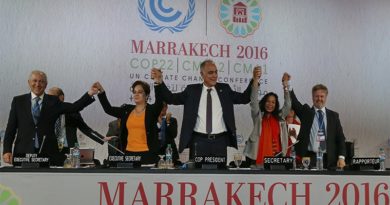Agriculture can deliver 30% of climate solutions by 2030 – WWF
The World Wide Fund for Nature on Tuesday June 12, 2018 launched a new initiative to urge businesses, cities, regions and citizens to ensure that the agricultural sector delivers up to 30% of the climate solutions needed by 2030.
Agriculture plays a key role in climate action – both in avoiding heat-trapping greenhouse emissions and building resilience to the inevitable impacts of climate change.
95% of all countries include the sector in their national climate action plans under the Paris Agreement (also known as Nationally Determined Contributions or “NDCs”).
“To curb climate change, we must address the second-greatest source of emissions: our use of land,” said Manuel Pulgar Vidal, head of WWF’s global climate and energy practice.
“By taking concrete action, businesses and local leaders can also encourage national governments to more aggressively reduce carbon emissions using every resource available, including trees, grasses and soil,” he added.
The initiative, dubbed the “30X30 Forests, Food and Land Challenge” covers the areas of forest and habitat conservation, food production and consumption, and land use across all sectors of the economy.
The call comes ahead of the Global Climate Action Summit in September which will bring leaders and people together from around the world to make deeper commitments toward climate change.
California Governor Edmund G. Brown Jr., who will co-chair the Summit along with the Executive Secretary of UN Climate Change, Patricia Espinosa, United Nations Secretary-General’s Special Envoy for Cities and Climate Change, Michael Bloomberg and Mahindra Group Chairman, Anand Mahindra, recently underlined the actions California is taking to deal with forest losses.
Forests serve as the state’s largest land-based carbon sink, drawing carbon from the atmosphere, but even a single wildfire can quickly undermine those benefits
“Devastating forest fires are a profound challenge to California,” Governor Brown said recently when issuing a sweeping Executive Order to increase the ability of forests to capture carbon.
“I intend to mobilize the resources of the state to protect our forests and ensure they absorb carbon to the maximum degree,” he said.
The food sector is also severely impacted. “Climate change is already disrupting and destabilizing our global food and agricultural systems,” said Paul Polman, CEO of Unilever.
“By eliminating habitat loss and degradation from our supply chains, we can prevent the emission of billions of tons of greenhouse gases. Businesses like ours have a responsibility and an opportunity to help the nations of the world meet and exceed the goals of the Paris Agreement,” Paul Polman added.
Businesses, state and local agencies, multilateral organizations, scientists, and other stakeholders can meet this challenge by taking concrete action to: Halve food loss and waste and consume conscientiously; sequester one gigaton of carbon per year in forests and other natural and working lands and enable better production of food and fiber by unlocking finance, providing tools to increase transparency, fostering public-private collaboration and protecting local rights.
Because Indigenous Peoples and local communities are among the most effective guardians of natural habitats and most directly harmed by the loss and degradation of forests and waterways, engaging and protecting these constituencies and their tenure rights will be critical to meeting the 30X30 Challenge.



